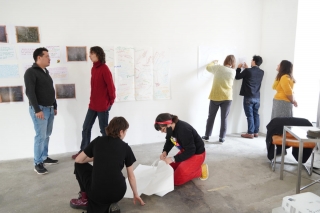UNIDEE Labs 2022: Artwork as Toolkit / Tools for the Commons | open call & selected residents
‘Tools for the Commons’ Lab (28th March – 2nd April):Nicole Sánchez (PT); Rachel Botha (IE); Nicholas Ferrara (IT); Anouk Beckers (NL) Calcagno Cullen (USA); Hwa Young (GB); Cristina Picco (IT).
Continuing the research arc around embedded arts practices curated by Andy Abbott, UNIDEE Residency programs (Cittadellarte-Fondazione Pistoletto’s educational ecology incepted in 1999) is pleased to invite applications for two Art Labs taking place in January 2022.
The labs are opportunities to share, unpack and apply your ongoing practice or action-research with a group of peers, the UNIDEE Residency Programs team and guests including researcher/curator Alessandra Saviotti (Italy/The Netherlands), art historian, independent researcher and curator Gemma Medina Estupiñán (Spain/The Netherlands), artist Owen Griffiths (UK), artist, researcher and activist Emanuele Braga (Italy), artist-choreographer, curator, activist and researcher Gabriella Riccio (Italy/Spain), writer, researcher, and political activist Keir Milburn (UK), and freelance cultural worker Gareth Brown (UK).
Through group critiques, facilitated workshops, collective trace-making, and informal and responsive activities we will make space in which you can gain multiple perspectives on the work you are undertaking in your locale, with a focus on identifying, testing and developing tools, technologies and methodologies that may be usefully applied in the situated contexts in which you are working.
Participants can choose to take part in week one lab ‘Artwork as Toolkit’, week two lab ‘Tools for The Commons’, or both.
The ‘embedded practice’ residencies in 2020 and 2021 (See 2020’s Embedded Arts Practice in a Postpandemic Future, 2021’s Groundwork for Embedded Arts Practice residencies and Tools and Technologies for Embedded Practice Arts Lab) brought together a broad range of practitioners from all over the world to share and develop their situated practices and action-research. In a time of changeable travel restrictions and social distancing measures, we found that residents valued the opportunity to share experiences of making socially-engaged work that is inextricably linked to its context and often relied on intimate connections and engagement with audiences, participants and collaborators.
Through group critiques, individual and collective trace-making, and handover sessions we found methods by which to share complex and sometimes overwhelmingly large-scale or long-term projects and praxis. Despite the specificity of the practices shared, we found there was benefit in temporarily taking them out of context and inviting fresh perspective to identify common themes, methodologies, approaches, and challenges. In our various (post-)pandemic contexts we also began to share experiences of (mis)using and applying ‘old’ technologies and emerging digital tools; from letters and postcards, to creative ‘hacking’ of conference call breakout rooms and screen sharing, to propositions for blockchain and cryptocurrencies to create fairer working conditions.
The Labs are an opportunity to continue this process together in presence.
We hope to reconnect and make new connections between practitioners and researchers who feel they would benefit from an intensive week of ‘putting their practice under the microscope’. This will be done not so much to accelerate or ‘push forward’ projects, but rather as a way to ‘zoom in’ and get a better sense of the detail of the practice. The ‘what’ and the ‘how’ of the practice as well as the ‘why’. We hope that this intimate collective examination will reveal the sometimes imperceptible movement and trajectory of such projects; helping each other over the humps and sticking points, as well as identifying potentially overlooked problems and obstacles in the road ahead.
The ‘Artwork as Toolkit’ lab will begin with the question ‘What are our tools?’ This lab stems from the intersection of two online platforms such as www.arte-util.org and www.dpe.tools presented by Alessandra Saviotti in collaboration with Gemma Medina and Owen Griffiths. Starting from the recent usological turn we will look into a set of tools and exercises developed as part of both platforms - such as the ‘Coefficient of Art’ and ‘A Capitalist Reading of our Usual Breakfast’ - that place art at the outset of the development of a set of tactics to achieve societal change. Analysing the idea of 'the-artwork-as-toolkit' the mentors will propose to look at how socially engaged art can be understood as an expanded technology that manifests itself as practices on a 1:1 scale. From our diverse and often specific practices and projects what surplus can we share, preserve, ferment and take forward for the future?
In the ‘Tools for the Commons’ lab we hope to bring together the experiences of artists and activists creating spaces for the growth of the commons; from the micro level of the individual, personal or subjective, through to the reclaiming or occupation of urban space, and the influencing of planning and policy. Mentors Emanuele Braga and Gabriella Riccio will draw upon their experiences in occupied art and cultural spaces MACAO (Milan) and L’Asilo (Naples) as well as the postcapitalist think-tank the Institute of Radical Imagination. Long-term comrades and collaborators Keir Milburn and Gareth Brown will bring a UK perspective on creative activism including the use of political strategy games, utopian consciousness raising sessions, and the establishment of Public-Common-Partnerships. What tools (or toys) for establishing and developing the commons can we identify, adapt or invent? Which of these are we able and willing to share, and under what terms?
Together we hope the labs will act as a key step in Cittadellarte and Pistoletto’s commitment to developing a network of solidarity and common intent across disciplines, and of creating a global community of practice across our many locals.
Participants will visit the exhibition platform dedicated to Cittadellarte’s demopraxy local chapter of Biella, the archipelagus as an entry point to its practice.
Up to 8 residents will take part in each lab at Cittadellarte Fondazione-Pistoletto using the UNIDEE Residency Program space as a shared studio for group discussions, sharing sessions and presentations, with the opportunity for exploration and engagement with the postindustrial and rural landscapes of Biella (Italy).
The methods we will draw upon include group critiques - at which you will be expected to give a short presentation of the practice or action research you are sharing as part of the lab - as well as group exercises, workshops and less formal activities (group meals, walks etc.). At the end of the lab you will be asked to leave a trace of your experience as a contribution to the creation of a toolkit for embedded arts practice.
Residents will stay in accommodation within Cittadellarte that includes basic cooking facilities.
Participants of ‘Artwork as Toolkit’ Lab will arrive on evening of Sunday 9th and depart Sunday 16th January 2022. Alessandra Saviotti, Gemma Medina Estupiñán and Owen Griffiths will be the guests for this week.
Participants of ‘Tools for the Commons’ Lab will arrive Sunday 16th and depart Sunday 23rd January 2022. Emanuele Braga, Gabriella Riccio, Keir Milburn and Gareth Brown will be the guests for this week.
Residents can apply to either or both of the Labs but please be aware that there will be some repetition of activities for those that participate in both.
There is a €280 fee for participation in the lab (or €420 for both) and accommodation (cleaning and sanitation) whilst in Biella. Participants will be required to arrange and cover their own travel to/from Biella and food/living costs whilst in Cittadellarte.
The UNIDEE programme thanks to the support of its partners is capable of keeping costs low for participants as our mission is to provide participants with the inspiration, motivation and tools to activate, develop or improve artistic initiatives based on the involvement of local ecologies.
We aim to select a cohort of 8 residents per lab through an invitation to participants of the 2020 and 2021 residency programmes (Embedded Arts Practice in a Postpandemic Future and 2021’s Groundwork for Embedded Arts Practice) and an open call. For alumni of previous programmes the ongoing embedded practice you will share can be that which you developed during your residency, an extension of this or a related project. Selection will be based upon participants’ willingness and ability to share the practice they are engaged in, and collectively reflect upon this with peers.
We will aim to select cohorts with a range of practices, location/perspective and experience.
Application is by Expression of Interest by filling out the application form with the following requirement:
• Indicate which lab you would like to apply to participate in (‘Artwork as Toolkit’, ‘Tools for the Commons’ or both)
• Up to 150 words about yourself and your practice and/or experience, and your suitability for the programme.
• Up to 200 words about the ongoing project or research that you will share as part of the lab including details about the local context (place, communities, audiences) and what long-term change you could hope to facilitate. For alumni of the previous UNIDEE embedded arts residencies the ongoing embedded practice you will share can be that which you developed during your previous residency, an extension of this, or a related project.
• Up to 150 words about how you may share this practice with others and what you hope to gain and learn from the week.
• CV / Portfolio in the same PDF (max 7 Mb).
Applicants must submit their application by email to: unidee@cittadellarte.it stating: “UNIDEE Labs 2022 application (your name)” as a subject line.
Deadline for submissions is Sunday 12th December and we will let successful applicants know a decision by Wednesday 15th December.
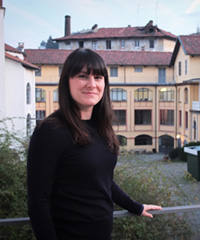
Alessandra Saviotti is a curator and educator who lives in Amsterdam. She is a PhD researcher at the Liverpool John Moores University - School of Art and Design.
Her focus is on socially engaged art, collaborative practices and Arte Útil. She is currently busy researching how alternative education models framed as Arte Útil could be successfully implemented within the institution of education fostering sustainability, hacking the institution itself.
She was part of the curatorial team of the 'Museum of Arte Útil' at the Van Abbemuseum (Eindhoven, NL); She led online and offline seminars at the San Francisco Art Institute (2017), California College of the Arts (2017), SALT Istanbul (2018), The Whitworth (2019), Chicago Architecture Biennial (2019), Accademia di Brera, Milan (2020), and she was the coordinator of the Escuela de Arte Útil at Yerba Buena Center for the Arts, San Francisco (US). She currently teaches at ArtEZ - International Master Artist Educator, Arnhem (NL) and she is a tutor at Accademia Unidee, Biella (IT). Since 2007 has been working in collaboration with several institutions such as SFMOMA (US), MAXXI, Rome (IT), Delfina Foundation, London (UK), Middlesbrough Institute of Modern Art (UK), Visible Project (IT), Manifesta 7 (IT), UNIDEE – Cittadellarte (IT), SALT (TR), Estudio Bruguera (USA) e Studio Grilli (BE). She is a 2013-14 van Eyck Akademie fellow, a 2015 Mondriaan Foundation grantee and a 2014 Demo Movin'Up grantee and she has been awarded an international mobility grant from i-Portunus – Creative Europe in 2019.
www.alessandrasaviotti.com
https://dpe.tools
www.arte-util.org
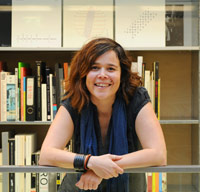
Dr. Gemma Medina is an art historian, curator and educator based in Eindhoven (NL). She focuses on the relationship between art, art institutions and society, researching arte útil, socially engaged art and collaborative practices. She participates in curatorial and pedagogical projects that fall outside standard discourse to bring art closer to non-specialized audiences, fostering connections and collaborative processes between artists, designers, and different communities.
Since 2007, she has worked in diverse projects with the Van Abbemuseum (Eindhoven, NL), like Be(com)ing Dutch (2007-2008), Play Van Abbe (2009), the residency program Artistic strategies in Psychiatry (2018) and Agents of Change (2015-2020). She was part of the curatorial team of the “Museum of Arte Útil” (2013-2014) and together with Alessandra Saviotti she co-curated “Broadcasting the archive” (2016-2018). Since 2015 she works with the Asociación de Arte Útil to facilitate and promote the use of the archive as a tool.
She holds a PhD in Contemporary Art and Humanities (Universidad de La Laguna, ES). She has facilitated seminars at Design Academy Eindhoven (2016), Universidad del País Vasco (2017), La Manufacture Atlántique, Bordeaux (2017), SALT Istanbul (2018), MUAC, México City (2018), The Whitworth (2019), Chicago Architecture Biennial (2019) and Iceland University of the Arts (2021). Currently, she teaches at ARTEZ - International Master Artists Educator and is a guest lecturer at ARTEZ - Master Kunsteducatie (Arnhem, NL).
She is a founder member of Axioma, Laboratorio de mediacion artistica (Canary Islands, ES). A platform encouraging the uses of art and archives as communal resources of knowledge.
https://gemmamedina.tumblr.com/
https://broadcastingthearchive.tumblr.com/
www.arte-util.org
https://www.facebook.com/axiomalaboratorio/
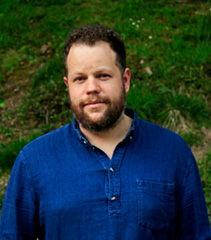
Owen Griffiths is an artist, workshop leader and facilitator. Using participatory and collaborative processes, his socially engaged practice explores the possibilities of art to create new frameworks, resources and systems. This takes many forms, but includes reclaiming and rethinking events, rituals and spaces of dialogue through making gardens, codesigning spaces, curating events and making feasts. Griffiths explores climate, landscape, urbanism, social justice, food systems and pedagogy, creating projects and events that prepare us for the work of the future.
Griffiths graduated from the School of Wales and Space at The Royal Danish Academy of the Arts, Copenhagen. He is a member of the Social Sculpture Research Unit at Oxford Brookes University.
In 2020 he established Ways of Working, a new community participation platform created to work in ways he feels are urgent; speaking to climate crisis, localism and radical collaborative projects. The companies goals are based around ideas of the long term, of collaboration and the practice of digging where you stand, in order to develop the collective radical imagination and realise projects which empower and create change.
aboutreconnection.com
waysofworking.org
ahoiwhatgrows.com
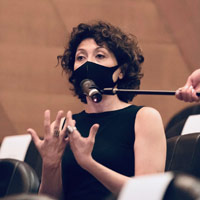
Gabriella Riccio is artist, activist and researcher based in Madrid and Naples. With a background as performer as well as in political studies, alongside her activity as choreographer, Gabriella is engaged in the movement for the commons and for self-governed cultural spaces. Recently she co-created the performance One Income, many worlds mixing performance and social research. As resident member of L’Asilo in Naples, she contributed to the drafting of the “Declaration of urban civic and collective use”. Gabriella is co-founding member of the Institute for Radical Imagination a trans-local think-tank producing knowledge on post-capitalist forms of life and models of cultural production as processes of social transformation. She published essays at the intersection of aesthetics, ethics and politics in contemporary prefigurative practices.
www.gabriellariccio.it
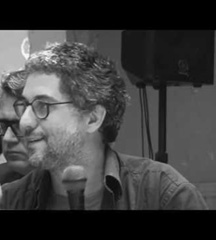
Emanuele Braga is an artist, researcher and activist, operating on the relationship between art, economy, and new technologies. In the past years he co-founded and developed several projects as Balletto Civile dance company in which he operated as a choreographer, performer and teacher, Macao, new centre for art and culture in Milano, Landscape Choreography cross-sectors, performative and research project, in which he operated as director, curator and researcher, IRI Institute of Radical Imagination, transnational artistic think tank questioning postcapitalism alternative, Ebony decolonize work, design platform for asylum seekers, and KIN lab, an art space in Milano.
https://www.macaomilano.org/
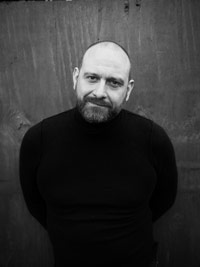
Dr. Keir Milburn is a writer, researcher, and political activist. He spent over a decade teaching political economy and organization at the University of Leicester but now works on municipalism, economic democracy and political economy for the Rosa Luxemburg Stiftung London Office. His most recent book Generation Left has proven highly influential provoking debate across several countries on generational political divides driven, in part, by generational imbalances in asset ownership. He is also a research associate of the think tank Common Wealth developing and implementing Public-Common Partnerships, an alternative model for the ownership and governance of assets which aims to build a self-expansive dynamic into the commons. His most recent work in this area designed democratic models of urban development for common ownership projects in London and Plymouth. He is currently working with the artist collective Cooking Sections to design and develop Public-Common Partnerships for regenerative aquaculture on the Isle of Skye as the next stage of their Turner prize nominated Climavore project. As a member of the Red Plenty Games Collective he designs and runs political strategy games and with Gareth Brown uses game play to research common political imaginaries. He is also a member of the #ACFM project through which he co-hosts the popular #ACFM podcast on Novara Media and runs Acid Communist consciousness raising sessions which build on the ideas of the late social theorist Mark Fisher.
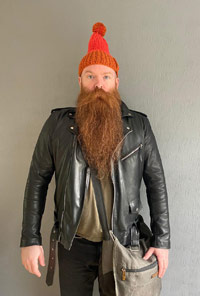
Dr. Gareth Brown is a freelance cultural worker from Leeds, UK. He was a lecturer working in organisation studies at the University of Leicester until a recent purge of union activists and anti-capitalist scholars. Gareth is one third of the left-wing game design collective Red Plenty Games with which he creates and runs games that explore utopian thinking, strategising for radical social change, and multi-actor political negotiation and coordination. He was formerly a founder member of the political organisation Plan C and is a long-term participant in the international surrealist movement as part of the Leeds Surrealist Group. He was for many years a professional musician, most notably as a member of the band Hood. Gareth’s publications in both academic and civil society press centre on the radical imagination, experimental revolutionary organisations, altered states of consciousness, and work.
PARTNERS
UNIDEE patrons are Regione Piemonte, Compagnia di San Paolo, CRT Fondazione Cassa di Risparmio di Torino, Creative Europe for "Alexandria (re)activating common urban imaginaries" and for "STARTS4Water", illycaffè S.p.A. and Fondazione Zegna
UNIDEE AIR partner: A.M. Qattan, Institut Français Italia
